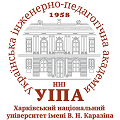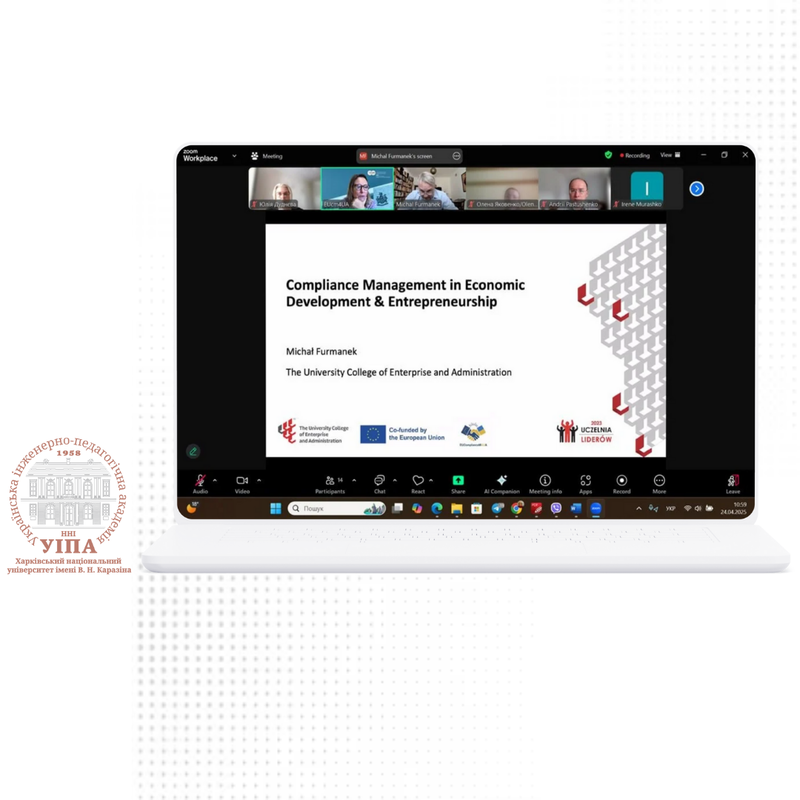In April-May 2025, an intensive online training covering key aspects of modern compliance management was held as part of the EUComplianceM4UA international project with the support of the Erasmus+ CBHE programme. For eight training days, participants from Ukraine, Portugal, Poland, the Czech Republic and Germany worked in a common learning environment, immersing themselves in the strategic, legal, ethical, managerial and digital dimensions of compliance.
The aim of the training was to create a new culture of academic teaching in the field of compliance education, exchange interdisciplinary approaches and prepare for the implementation of innovative solutions in the curricula of partner universities from Ukraine.
The training programme included four stages:
22-23 April (Universidade Portucalense, Porto, Portugal): the training was opened with a block dedicated to the legal framework of compliance management, the relationship between legal systems and business cultures, and the role of artificial intelligence in adapting compliance procedures. Special attention was paid to anti-corruption regulation in the EU, the UK and the US (EU Directive, Bribery Act, FCPA). The second day of the training was devoted to business ethics and practical implementation of risk management compliance. The participants learnt about the principles of building an ethical culture in organisations, mechanisms for implementing internal compliance systems and practices for responding to ethical violations, the moral basis of compliance, ethical risk areas and strategic tools for supporting integrity leadership.
24-25 April (Wyzsza Szkoła Przedsiebiorczosci i Administracji, Lublin, Poland): Polish colleagues presented an interdisciplinary view of compliance in public administration, local government and business. The discussion focused on how compliance can support economic development, build investor confidence and act as an effective tool in the fight against financial abuse. Participants analysed ways to implement transparency policies, the importance of internal audits and procedures to prevent violations. Particular attention was paid to the development of ethical compliance policies and the formation of professional teams responsible for their implementation. The participants also discussed the reputational risks faced by modern organisations, including the consequences of non-compliance with ethical standards in the form of loss of trust from clients, partners and society. Discussions included practical cases from business, education and the public sector. Participants had the opportunity to compare European approaches to compliance with Ukrainian realities, taking into account the challenges of wartime, economic transformation and changing professional standards.
29-30 April (The University of Chemistry and Technology, Prague, Czech Republic): ethical governance, resolving ethical dilemmas, developing corporate codes of conduct, social responsibility. Participants discussed the key principles of ethical governance, the importance of transparency, accountability and integrity as the basis for trust in institutions. Considerable attention was paid to analysing ethical risks in procurement, building a moral climate in organisations, the impact of behavioural factors on decision-making, and current challenges of social and regulatory compliance. A separate block was devoted to the development of corporate codes of ethics as a tool for shaping expected behaviour and managing reputational risks. Practical cases related to the conflict between economic benefits and ethical standards were reviewed, and ideas about modern compliance mechanisms that support business sustainability and prevent violations were discussed.
7-8 May (Hochschule Wismar, Wismar, Germany): legal requirements in the field of European regulation, social compliance, personal data protection, digital transformation of education and ESG strategies. Considerable attention was paid to the issues of social compliance in higher education, protection of employees' rights, gender equality, digital integrity and due diligence obligations of counterparties. The participants learned about modern approaches to teaching ethics and compliance, including the use of digital technologies in education, the formation of an ethical culture and the development of effective educational strategies. ESG approaches, avoiding ‘green camouflage’ in reporting, personal data protection and corporate responsibility to consumers were also discussed. A special place in the programme was given to compliance in transition economies. The programme explored Ukraine's experience of adapting compliance practices in difficult circumstances - through electronic registers, anti-corruption mechanisms, digital openness and transparency even in times of war.
Overall results:
- 16 speakers from 5 countries;
- 8 days of intensive training;
- interdisciplinary approach: law, management, ethics, digitalisation, education;
- practical cases, interactive discussions, intercultural dialogue.
Members of the project team from the ERI “Ukrainian Engineering and Pedagogical Academy" of V.N. Karazin Kharkiv National University took an active part in the training: Maryna Vasylieva, Roman Nesterenko, Viktoriia Chobitok, Yuliia Dudnieva, Yuliia Bezuhla, Tetiana Kostrova. They joined the discussions and presented their vision of adapting European approaches to the Ukrainian context.
The international training demonstrated the high level of professional training of Ukrainian participants, the relevance of European practices for our context, and the need to integrate compliance as an interdisciplinary competence into the curricula of Ukrainian universities.




